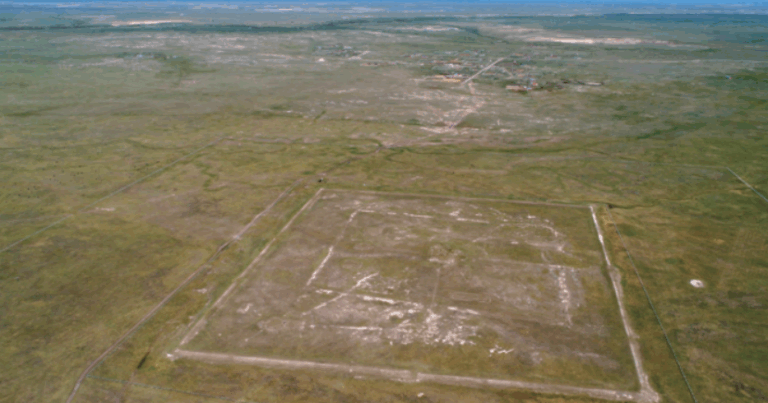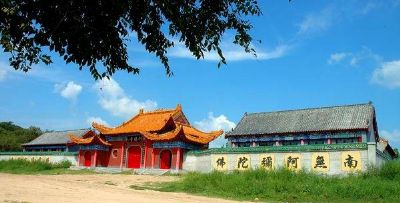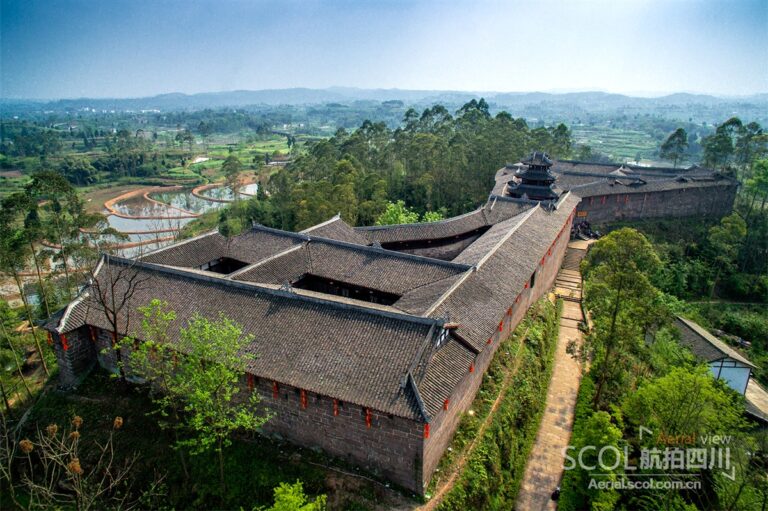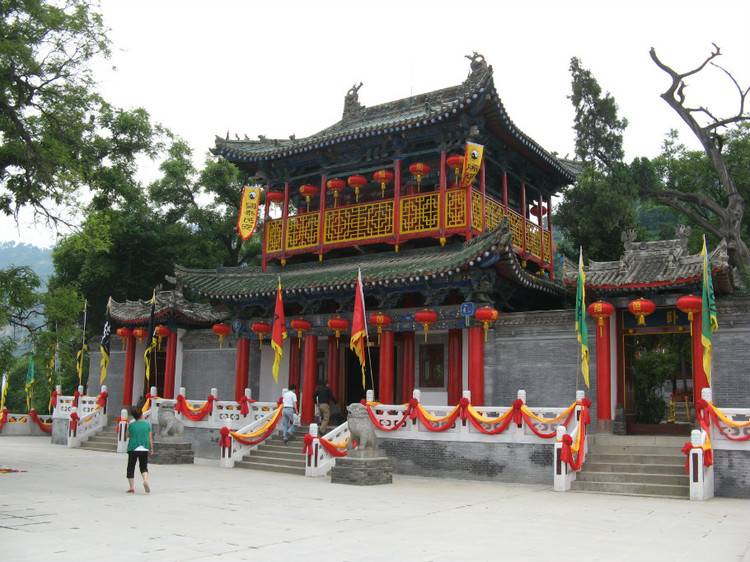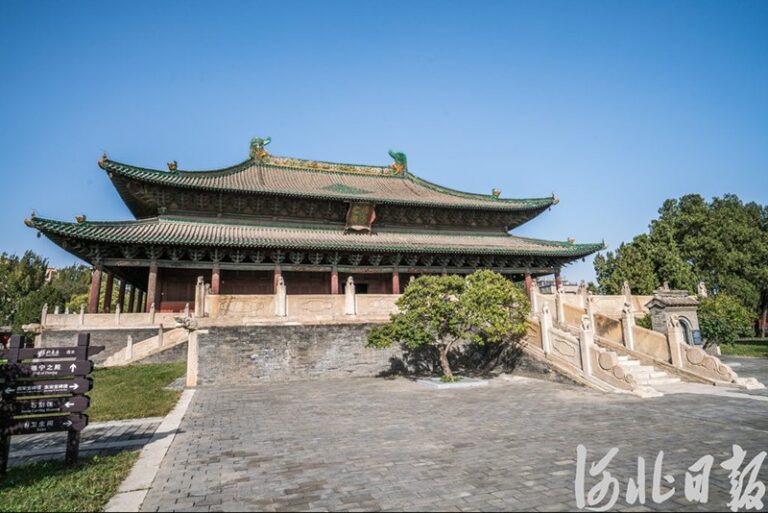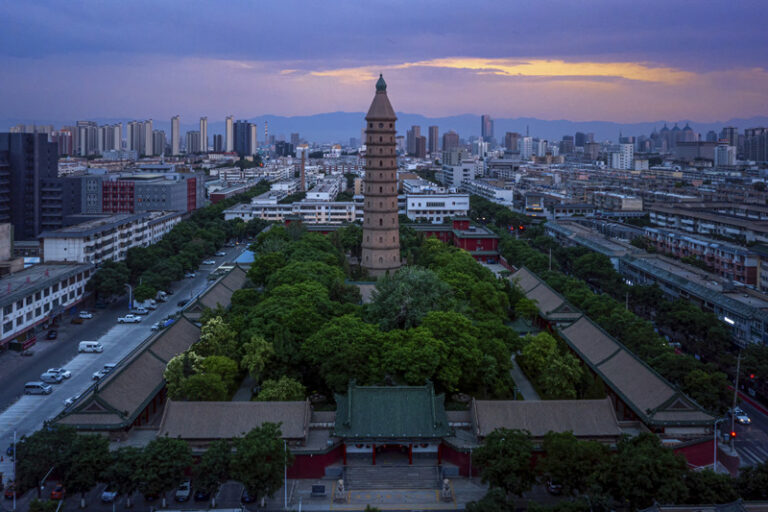The Ultimate Guide to Jiyuan Jidumiao: Where History Meets Serenity
An Essential Guide to Visiting Jiyuan Jidumiao
In This Guide
- An Essential Guide to Visiting Jiyuan Jidumiao
- The Rich History of Jiyuan Jidumiao
- Main Highlights: What to See at Jiyuan Jidumiao
- Planning Your Visit: A Practical Guide
- Tickets, Hours, and Booking
- How to Get There
- Local Cuisine and Accommodation
- Frequently Asked Questions
- Final Thoughts on Your Trip
Nestled just two kilometers northwest of Jiyuan City, Jiyuan Jidumiao, also known as the North Sea Temple of Jiyuan, stands as a remarkable testament to China’s rich historical and cultural tapestry. This sacred site, dedicated to the deity of the Jishui River, is the sole surviving and most expansive complex of the ancient “Four Rivers” shrines that once thrived in the region. Recognized as a key national cultural relic, it is often heralded as a “museum” of ancient architecture in Central China, showcasing the grandeur of traditional Chinese design.
Dating back to the Sui Dynasty, the temple’s origins are steeped in centuries of agricultural reverence and spiritual practice. In ancient times, the Jishui River—renowned for its distinctive flow into the sea, alongside the Yellow River, Yangtze River, and Huai River—was celebrated as one of the four sacred rivers. This historical significance birthed a culture of worship that saw emperors and officials regularly paying homage to the river gods, reflecting the intertwining of nature, divinity, and the daily lives of the people.
As you approach Jiyuan Jidumiao, the awe-inspiring architecture immediately captivates the eye. The temple grounds span over 400 acres, featuring a harmonious blend of meticulously crafted wooden structures, including the magnificent “Qingyuan Cave” gate and the grand main hall dedicated to the river deity. These structures, with their sweeping roofs and intricate carvings, stand resilient against the test of time—some dating back to the Northern Song Dynasty—offering an immersive glimpse into the architectural prowess of ancient China.
Visitors to this sacred site not only encounter a place of worship but also a vibrant narrative that encapsulates the evolution of water deity veneration in Chinese history. From the legends of ancient rituals to the serene beauty of the surrounding landscapes, Jiyuan Jidumiao invites travelers to explore its storied past while reflecting on the natural forces that have shaped the region. Whether you are a history buff, a lover of architecture, or simply seeking a tranquil retreat, the temple promises an enriching experience that resonates deeply with the essence of Chinese culture.
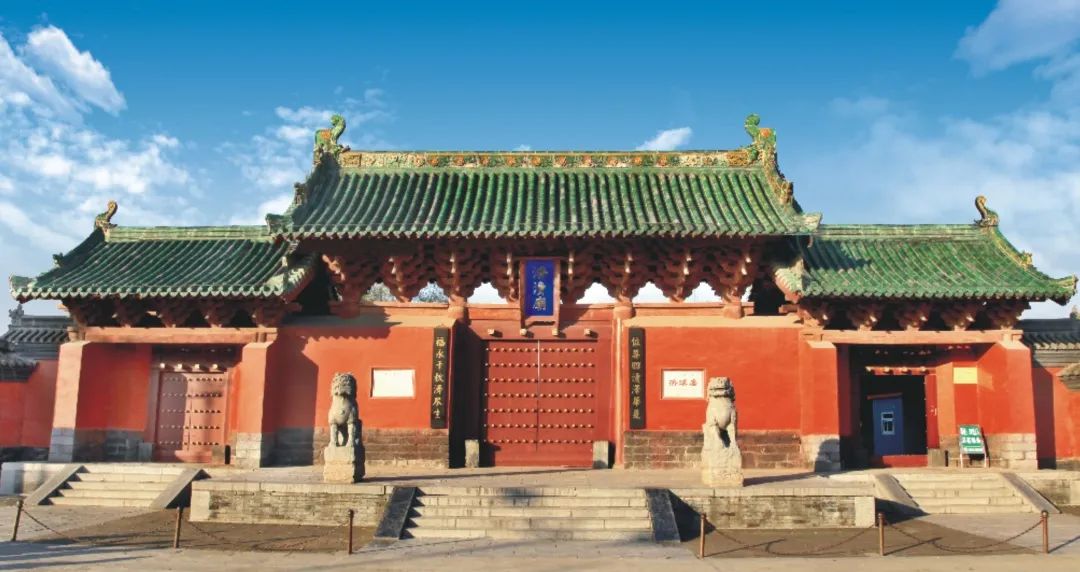
Jiyuan Jidumiao.
The Rich History of Jiyuan Jidumiao
Jiyuan Jidumiao, officially known as Jiyu Du Beihai Temple, is a historical marvel located in Jiyuan City, Henan Province, approximately two kilometers from the source of the Jishui River. Recognized as the most well-preserved and grandest cultural heritage site among the ancient four rivers (known as the “Four Duz”), it serves as a national key cultural relic protection unit and is often referred to as a “museum” of ancient architecture in Central China.
The temple’s significance dates back to ancient times when the Jishui River, which flowed independently into the sea, was regarded alongside the Yangtze, Yellow, and Huai Rivers as one of the four revered rivers. In an era characterized by agrarian societies, with limited scientific understanding, the worship of natural deities became prevalent. People would construct shrines to invite rain and ensure bountiful harvests, leading to elaborate rituals and ceremonies that were sanctioned by successive emperors.
The official establishment of the temple occurred during the Sui Dynasty in 582 AD, when the government built it to honor the deity of the Jishui River, initially titled the “Great Jishui God of the Northern Duz.” Over the centuries, it underwent various name changes and expansions. During the Tang Dynasty, in 744 AD, Emperor Xuanzong conferred the title of “Qingyuan Gong” upon the river god, leading to the temple also being called Qingyuan Temple. Subsequent emperors continued to honor the deities, and by the Ming Dynasty, the temple complex expanded to cover over 400 acres.
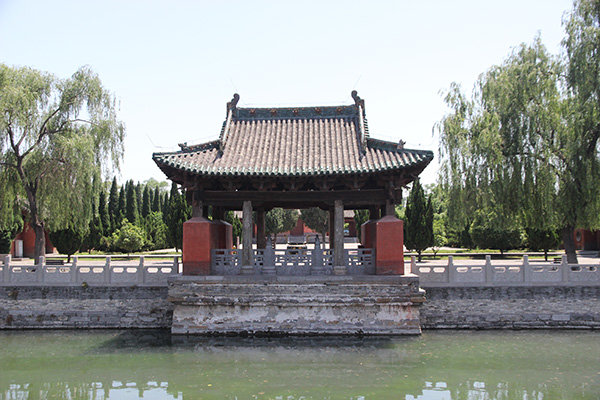
Jiyuan Jidumiao.
The temple’s architectural style reflects the evolution of Chinese religious architecture, particularly within the context of water deity worship. Each dynasty contributed to the temple’s grandeur, with emperors regularly sending officials to perform rituals, especially during significant national events like warfare, succession disputes, and droughts. This ongoing tradition of worship persisted until the Qing Dynasty, marking the temple as a continuous center of cultural and spiritual significance.
The temple complex features several noteworthy structures, including the Qingyuan Cave Gate, a wooden construction that appears precariously balanced yet stands firm after centuries of weathering. The main hall, built during the Northern Song Dynasty, is a striking example of ancient wooden architecture, characterized by its intricate design and historical preservation.
The Jiyuan Jidumiao not only serves as a religious site but also encapsulates the history of water deity worship in China, reflecting the cultural and spiritual values of successive dynasties. The Jishui River, crucial to the development of early Chinese civilization, was integral to the establishment of the Xia Dynasty, the first recorded dynasty in Chinese history. The river, winding through the landscape, has inspired countless poets and scholars, contributing to the cultural richness of the region.
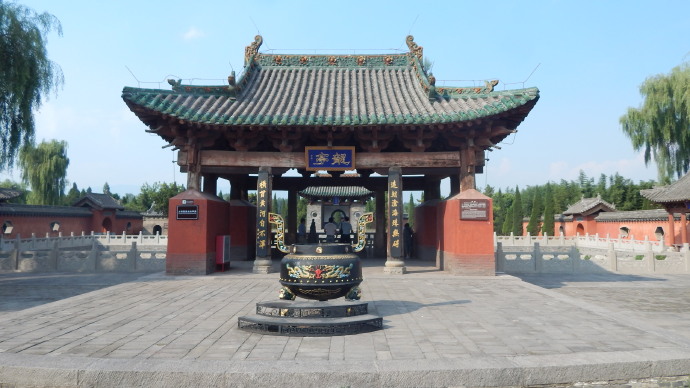
Jiyuan Jidumiao.
Today, Jiyuan Jidumiao stands as a testament to the enduring legacy of ancient Chinese architecture and spirituality, drawing visitors who seek to connect with its rich history and cultural significance.
Main Highlights: What to See at Jiyuan Jidumiao
Jiyuan Jidumiao, also known as the Jiyu Northern Sea Temple, stands as a magnificent testament to ancient Chinese architecture and cultural heritage. Located just 2 kilometers northwest of Jiyuan City, this historical site is the largest and best-preserved of its kind in Henan Province, often referred to as the “museum” of ancient architecture in Central China. Here are the main highlights that make Jiyuan Jidumiao a must-visit destination for travelers.
Architectural Marvels
Upon entering through the grand “Qingyuan Cave” gate, visitors are greeted by the stunning wooden structure that showcases traditional Chinese architectural style. The impressive flying eaves and intricate wooden beams have stood the test of time since their construction in the early Song Dynasty. The temple complex spans over 400 acres and features multiple halls and pavilions, each adorned with vibrant green glazed tiles and exquisite carvings that reflect the artistry of past dynasties.
Historical Significance
Jiyuan Jidumiao is not only an architectural wonder but also a site steeped in history. Established in 582 AD during the Sui Dynasty, this temple was dedicated to the deity of the Jishui River, one of the four great rivers in ancient China. Over centuries, it has hosted numerous imperial rituals and ceremonies, highlighting its importance in Chinese culture and governance. The temple’s historical narrative intertwines with the worship of water gods, showcasing the reliance of ancient agricultural societies on the natural elements and their deities.
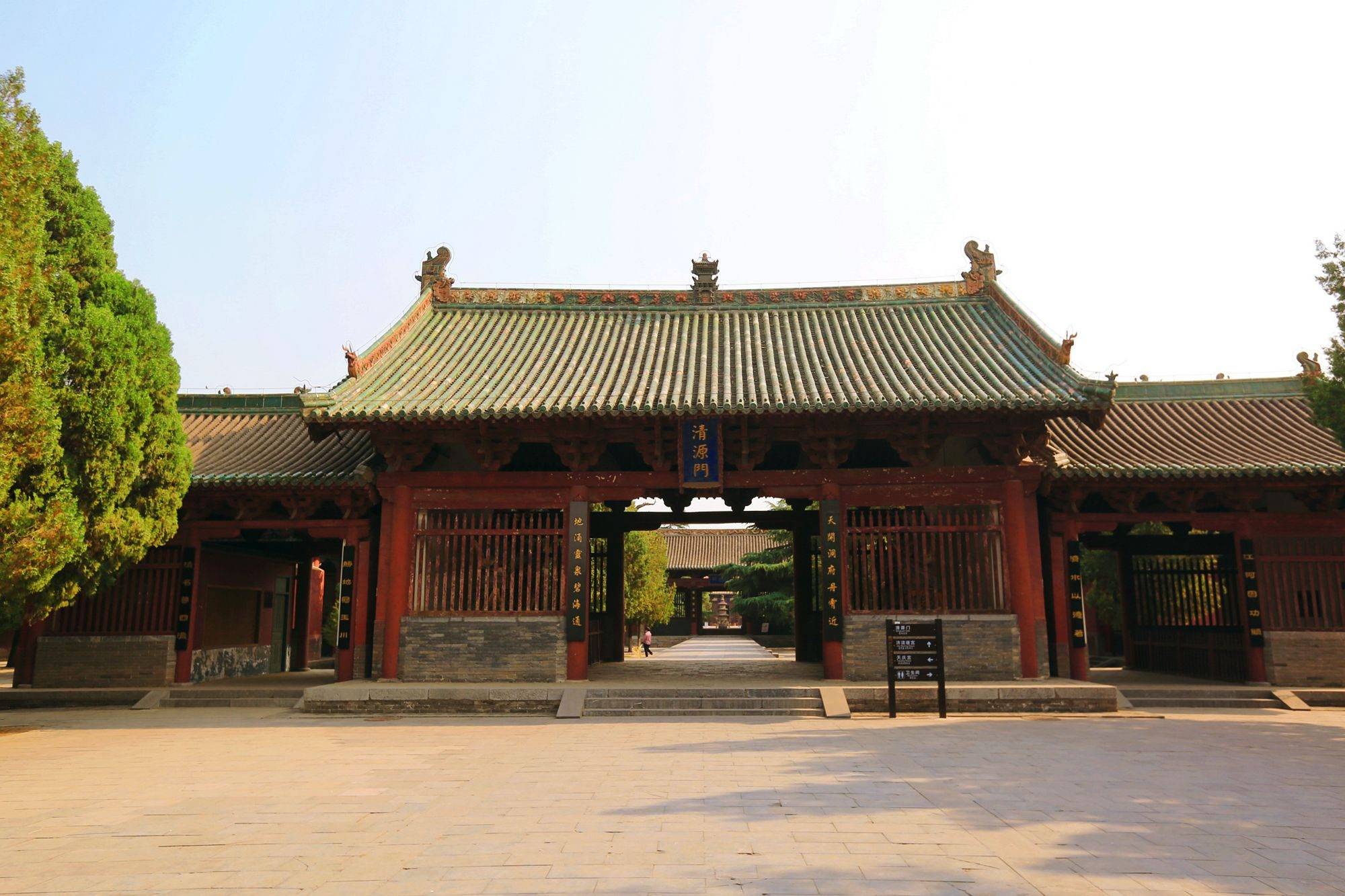
Jiyuan Jidumiao.
Cultural Heritage
The temple complex served as a crucial center for religious and cultural activities for over a millennium. Throughout its history, emperors have made pilgrimages here to pay their respects, especially during significant events such as droughts or military campaigns. These rituals solidified the temple’s status as a vital spiritual and governmental hub, symbolizing the relationship between the divine and earthly governance.
Scenic Surroundings
Nestled in a serene environment, Jiyuan Jidumiao is bordered by lush greenery and tranquil waters, providing a picturesque backdrop that enhances the spiritual atmosphere of the site. Visitors can take leisurely walks along the pathways lined with ancient trees and enjoy the peacefulness that envelops the area. The nearby dragon pond adds to the charm, offering a serene spot for reflection and appreciation of nature.
Unique Features
One of the temple’s most notable features is the “Sleeping Palace” of the water deity, showcasing remarkable wooden construction that has remained intact for over a thousand years. The intricate details of the structure and the vibrant colors of the tile work are a feast for the eyes. Additionally, the temple houses various stone inscriptions and historical tablets, offering insights into the rituals, beliefs, and historical events associated with the site.
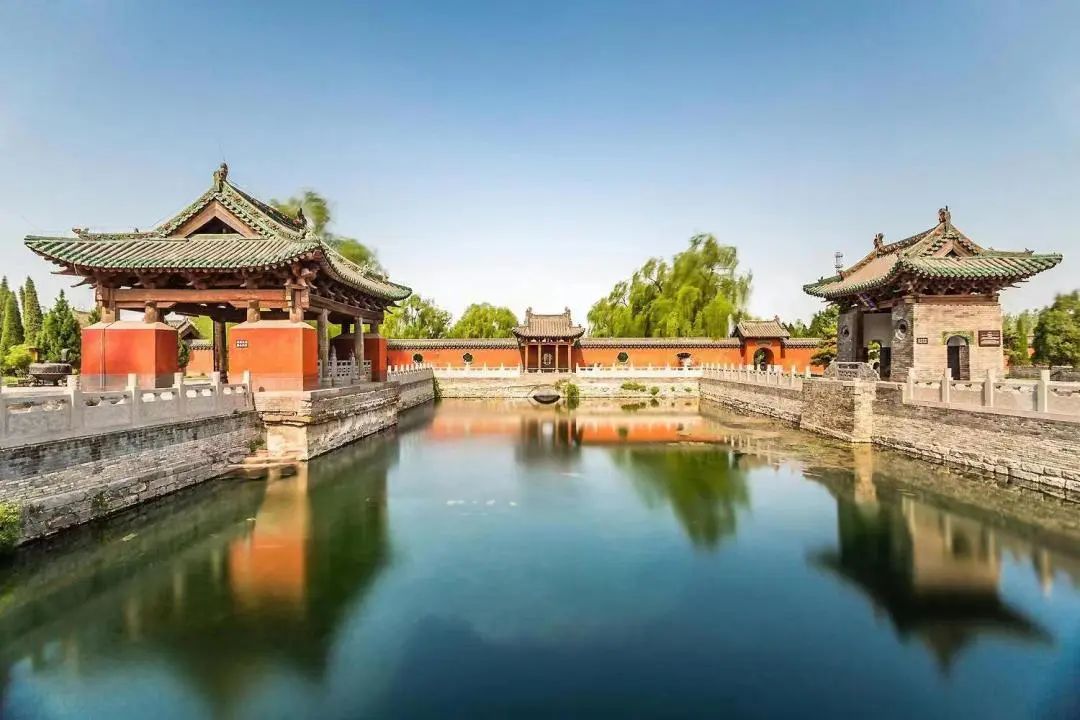
Jiyuan Jidumiao.
Visiting Jiyuan Jidumiao is a journey through time, where ancient beliefs and architectural brilliance come together in a harmonious blend that captivates the imagination and enriches the spirit. Whether you are a history enthusiast, an architecture lover, or simply seeking tranquility, this temple provides a profound experience that connects you with China’s rich cultural heritage.
Planning Your Visit: A Practical Guide
Practical Guide to Visiting Jiyuan Jidumiao (济渎庙)
Overview
Jiyuan Jidumiao, also known as the Temple of the Water God, is a significant cultural and historical site located about 2 kilometers northwest of Jiyuan City, Henan Province. Renowned for its impressive architecture and rich history, this temple is dedicated to the worship of the River God, part of the ancient worship of water deities in China. With its expansive grounds and intricate structures, it is often referred to as a museum of ancient architecture in Central China.
Getting There
- By Public Transport: The most convenient way to reach Jiyuan Jidumiao is by taking a local bus to the “Jidumiao” stop on Jidumiao Avenue. The area surrounding the temple is spacious, making it easy to spot the entrance.
- By Car: If you’re driving, the temple is easily accessible via local roads. Parking is available nearby.
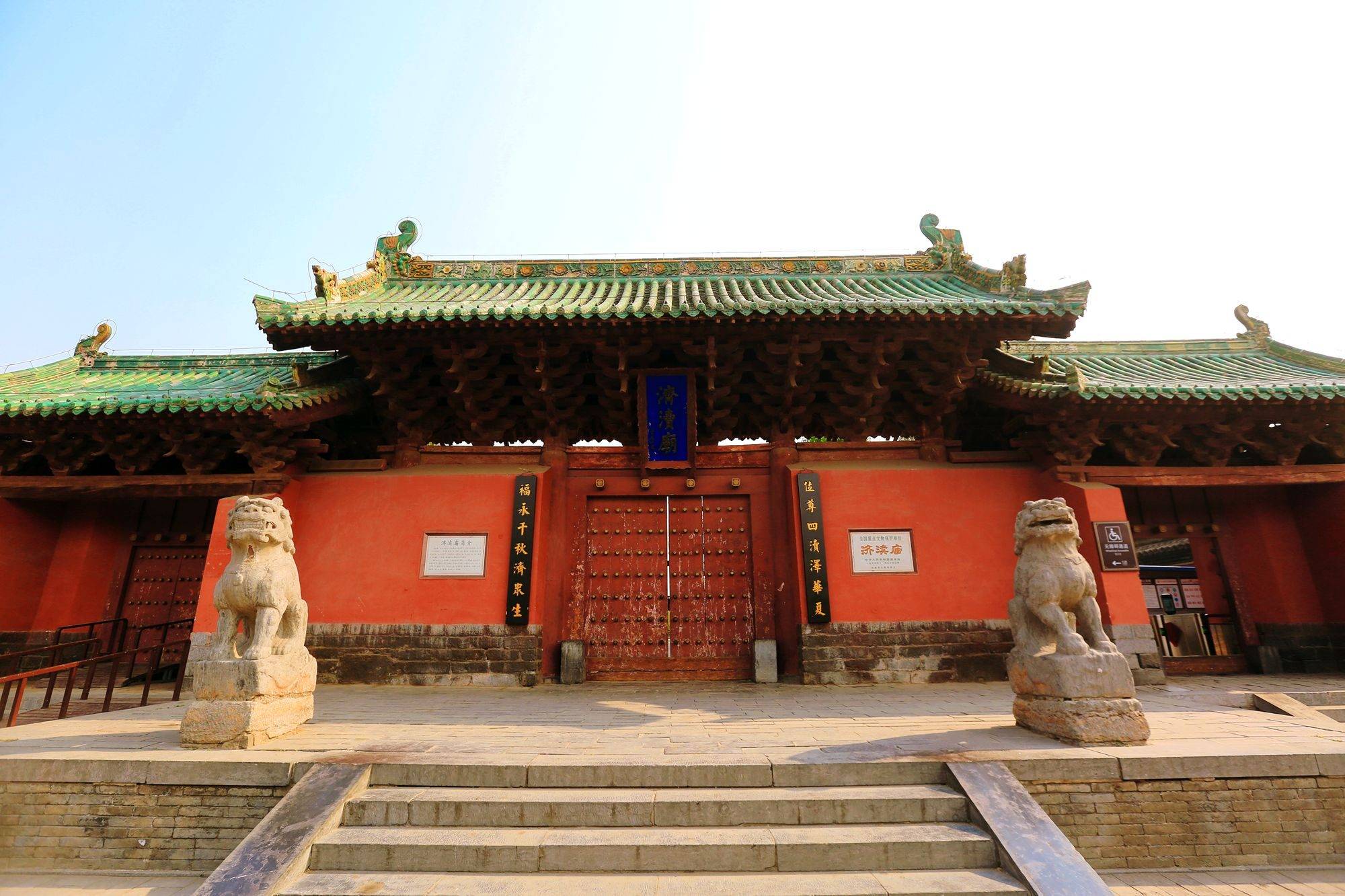
Jiyuan Jidumiao.
Opening Hours
Jiyuan Jidumiao is open daily from 8:00 AM to 6:30 PM. It is advisable to arrive early to avoid crowds, especially on weekends and public holidays.
Admission
Entrance to the temple is generally free for local residents; however, visitors may be required to pay a nominal fee. It’s best to check in advance for any changes in admission policies or special events that might affect access.
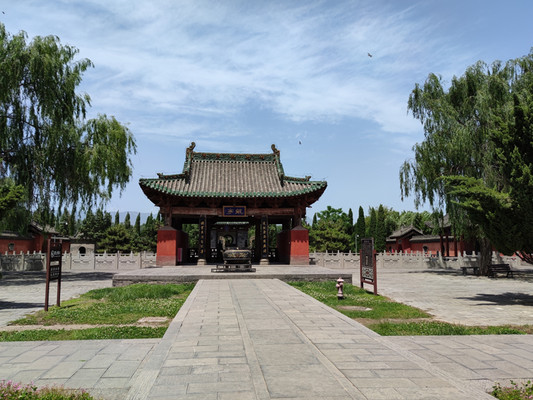
Jiyuan Jidumiao.
What to See
- Main Entrance: The grand entrance, known as the “Qingyuan Cave,” features traditional wooden architecture, showcasing the exquisite craftsmanship of the Song Dynasty. The structure is supported by massive wooden beams and has a strikingly unique roof design.
- Palace of the Water God: After passing through the main entrance, visitors can explore the grand hall dedicated to the River God, decorated with vibrant colors and intricate carvings. The hall is considered one of the best-preserved wooden structures from the Northern Song period.
- Stone Tablets and Historical Monuments: Scattered throughout the temple grounds are various stone tablets that chronicle the history of water worship and the temple’s significance through different dynasties. Be sure to take a moment to read the inscriptions, which provide insight into the cultural heritage of the area.
- Dragon Pool: Just beyond the temple, the Dragon Pool is a serene spot where visitors can unwind. It is said to be the origin of the River God and features traditional pavilions and lush landscaping.
Tips for Visitors
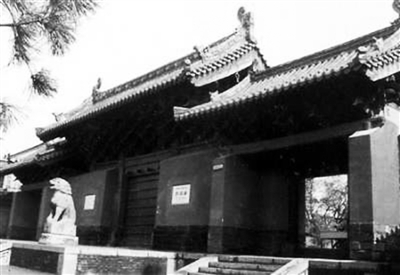
Jiyuan Jidumiao.
- Respect the Environment: As a place of worship, maintain a respectful demeanor. Avoid loud noises and disruptive behavior, especially in prayer halls.
- Dress Appropriately: While there is no strict dress code, it is recommended to dress modestly to honor the cultural significance of the site.
- Bring Water and Snacks: Facilities for food may be limited, so it’s a good idea to carry water and light snacks, especially if you plan to explore the extensive grounds.
- Check for Events: Occasionally, Jiyuan Jidumiao hosts cultural festivals or traditional ceremonies. Check local listings or the temple’s official website for any events coinciding with your visit.
Nearby Attractions
- Jiyuan Science and Technology Museum: Located just a few kilometers from the temple, this museum offers educational exhibits on science and technology.
- Wangwu Mountain: A stunning natural area known for its hiking trails and breathtaking views, ideal for those looking to explore the outdoors after visiting the temple.
Jiyuan Jidumiao is a remarkable destination that not only showcases the architectural beauty of ancient China but also provides a glimpse into the spiritual traditions of water worship. Whether you’re a history buff, architecture enthusiast, or simply seeking a serene escape, this temple promises a memorable experience.
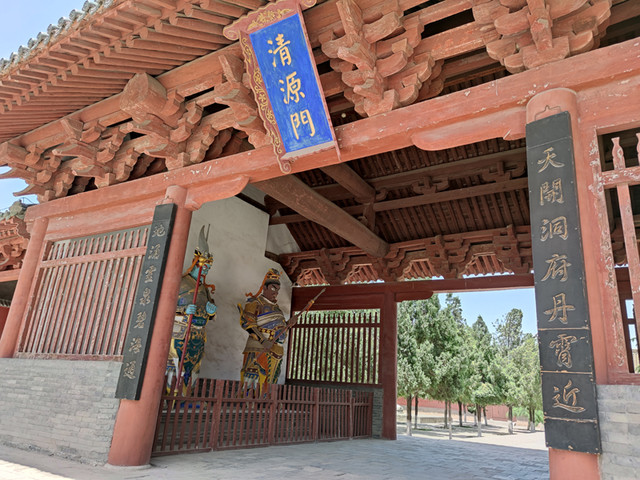
Jiyuan Jidumiao.
Tickets, Hours, and Booking
When planning your visit to Jiyuan Jidumiao (济渎庙), also known as the Jidu North Sea Temple, it’s important to know about ticketing to ensure a smooth experience.
Ticket Information
Entrance Fee:
Admission to Jiyuan Jidumiao is free for local residents. However, visitors from outside the region may be required to pay a nominal fee, which is generally affordable. It’s advisable to check the latest updates on pricing before your visit, as fees may vary based on special events or exhibitions.
Hours of Operation:
Jiyuan Jidumiao welcomes visitors daily from 8:00 AM to 6:30 PM. Be sure to plan your visit within these hours to enjoy the temple and its surroundings thoroughly.
Accessibility:
The temple is designed to be accessible to all visitors. If you have specific needs, it’s recommended to contact the temple administration in advance to ensure that appropriate arrangements can be made.
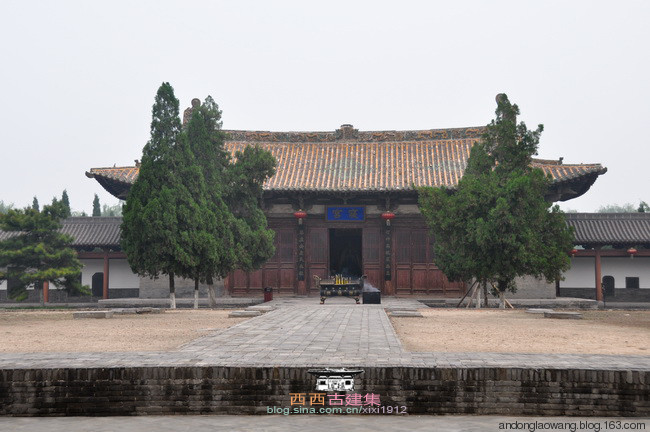
Jiyuan Jidumiao.
Visitor Tips:
– Arrive early to avoid crowds, especially during weekends and public holidays.
– Consider joining a guided tour for a deeper understanding of the temple’s rich history and cultural significance.
– Bring your camera, as the stunning architecture and serene landscapes provide excellent photo opportunities.
Make sure to enjoy the historic atmosphere and the spiritual ambiance of Jiyuan Jidumiao during your visit!
How to Get There
Reaching Jiyuan Jidumiao, a historic temple located in Jiyuan City, Henan Province, is a rewarding experience that combines cultural heritage with scenic beauty. This guide will help you navigate the various transportation options available to get to this remarkable site.
By Air
If you are traveling from abroad or from a distant city within China, the nearest major airport is Zhengzhou Xinzheng International Airport (CGO), located approximately 140 kilometers from Jiyuan. From the airport, you can either rent a car or take a taxi to Jiyuan City. The drive typically takes around 2 to 2.5 hours, depending on traffic.
By Train
Jiyuan is well-connected by the railway network, making it easy to reach by train. The Jiyuan Railway Station offers high-speed train services from major cities. For instance, you can take a high-speed train from Zhengzhou, which takes about an hour. Once you arrive at Jiyuan Railway Station, local taxis and buses are readily available to take you to Jiyuan Jidumiao.
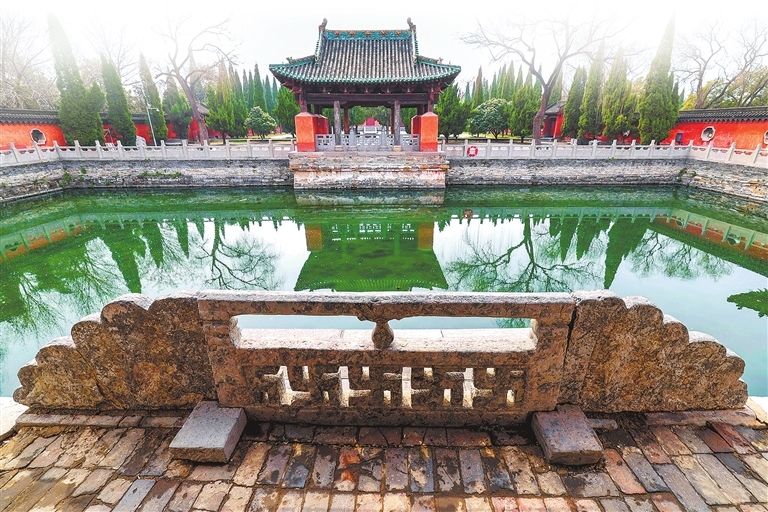
Jiyuan Jidumiao.
By Bus
For those preferring a more economical option, long-distance buses operate frequently from nearby cities like Zhengzhou, Luoyang, and Kaifeng. Buses to Jiyuan can be boarded at the respective bus stations in those cities. The journey time varies depending on the city of departure but generally ranges from 1.5 to 3 hours. Upon arrival at Jiyuan’s main bus station, you can take a taxi or a local bus to the temple.
Local Transportation
Once in Jiyuan, reaching Jiyuan Jidumiao is straightforward. Taxis are available throughout the city, and the fare to the temple is relatively inexpensive. Alternatively, local buses may also serve routes to the Jidumiao area, though schedules can be less frequent, especially during off-peak hours.
Cycling or Walking
For the more adventurous, cycling is a popular way to explore Jiyuan’s picturesque surroundings. The temple is located about 2 kilometers northwest of the city center, making it accessible for cyclists and even those who prefer to walk. The route is scenic, and walking allows you to immerse yourself in the local culture and environment.
Conclusion
Visiting Jiyuan Jidumiao is not just about the destination but also the journey. Whether you choose to travel by air, train, bus, or even on foot, each mode of transportation offers a unique way to experience the beauty and history of this remarkable site. Plan your trip accordingly, and enjoy the rich cultural heritage that Jiyuan has to offer.
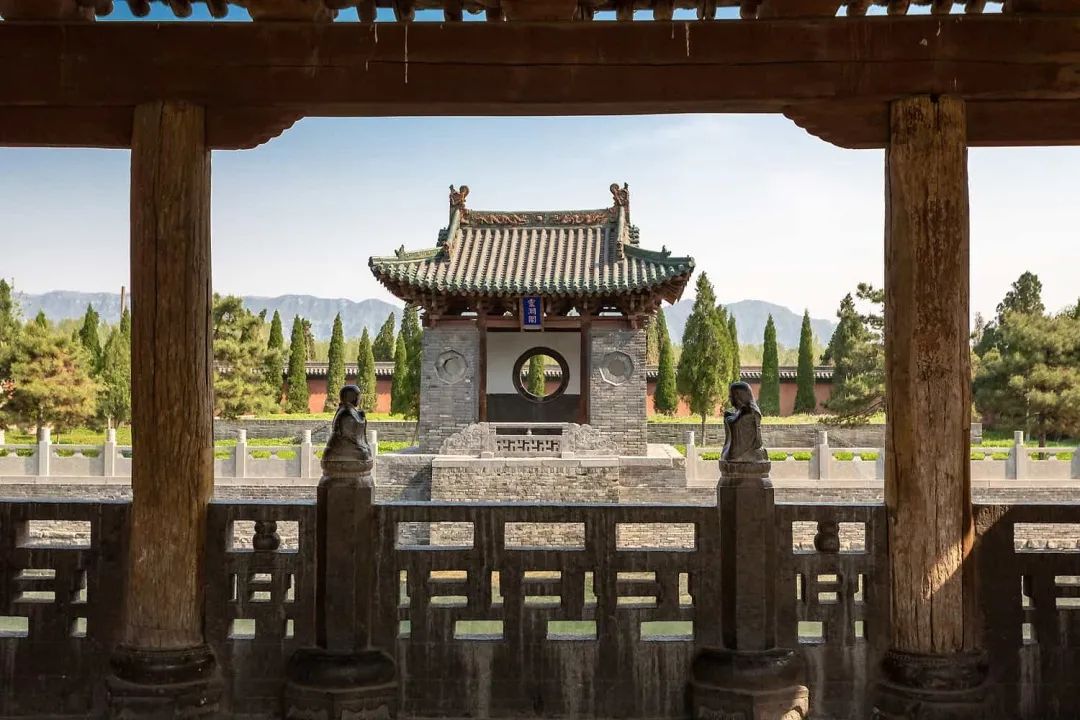
Jiyuan Jidumiao.
Local Cuisine and Accommodation
Visiting Jiyuan Jidumiao is a cultural journey, and to enhance your experience, finding suitable dining options and accommodations is essential. Here’s a guide to help you make the most of your visit.
Where to Eat
-
Local Cuisine
While exploring the area around Jiyuan Jidumiao, don’t miss trying some local specialties. The region is known for its Dumplings (饺子) and Noodle Dishes (面条). Many local restaurants serve hearty portions at reasonable prices. -
Recommended Restaurants:
- Jiyuan Noodle House (济源面馆): Famous for its handmade noodles, this cozy eatery is a favorite among locals. The broth is rich, and the noodles are perfectly chewy.
- Dumpling King (饺王): A must-visit for dumpling lovers, this restaurant offers a variety of dumplings, including pork, vegetable, and seafood options. Pair them with a traditional dipping sauce for an authentic flavor.
-
Jiyuan Vegetarian Cuisine (济源素食): For a lighter option, this vegetarian restaurant features a menu full of fresh vegetables, tofu dishes, and local grains, perfect for health-conscious travelers.
-
Street Food
If you’re feeling adventurous, the streets around Jiyuan Jidumiao often have vendors selling snacks like Grilled Skewers (串烧) and Fried Rice Balls (炸饭团). These are great for a quick bite while you explore.
Accommodation Options
- Hotels
- Jiyuan International Hotel (济源国际大酒店): This upscale hotel offers comfortable rooms with modern amenities, including free Wi-Fi and breakfast. Its central location makes it convenient for accessing local attractions.
-
Jiyuan City Hotel (济源城市酒店): A mid-range option that provides clean and cozy accommodations. This hotel is known for its friendly staff and proximity to Jiyuan Jidumiao.
-
Guesthouses and Inns
For a more local experience, consider staying at a guesthouse or inn. - Old Town Guesthouse (老街客栈): Nestled in the heart of Jiyuan, this charming guesthouse features traditional decor and a warm atmosphere. The owners are helpful and often provide insights about the local area.
-
Riverside Inn (河边客栈): This quaint inn is located near the river, offering a peaceful stay with beautiful views. Enjoy the serene environment while being just a short distance from the temple.
-
Hostels
If you’re traveling on a budget, there are a few hostels available in Jiyuan. They provide dormitory-style accommodations and a chance to meet fellow travelers. - Backpacker’s Hostel (背包客旅馆): A popular choice among young travelers, this hostel offers affordable rates, communal spaces, and a friendly vibe.
No matter your preference in food or accommodation, Jiyuan Jidumiao offers a range of options that cater to different tastes and budgets, ensuring that your visit will be both enjoyable and memorable.
Frequently Asked Questions
-
What is Jiyuan Jidumiao (济渎庙)?
Jiyuan Jidumiao, also known as the Jiyu North Sea Temple, is a significant historical and cultural site located approximately 2 kilometers northwest of Jiyuan City, in Henan Province, China. It is renowned for being the best-preserved and largest ancient architectural complex dedicated to the worship of river deities, particularly the Jiyu God. -
When was Jiyuan Jidumiao built?
The temple’s origins date back to the Sui Dynasty, with the establishment of the shrine in 582 AD. It has been expanded and renovated over the centuries, notably during the Tang and Song Dynasties, evolving into its current form. -
What are the main features of the temple?
Jiyuan Jidumiao boasts stunning ancient architecture, including the impressive main hall, known as the “Qingyuan Palace,” which features intricate wooden structures and beautiful glazed tiles. The temple complex spans over 400 acres and includes several worship halls and scenic areas such as the Dragon Pool. -
How can I get to Jiyuan Jidumiao?
The temple is easily accessible by public transportation from Jiyuan City. You can take a local bus to the “Jiyu Dajie” stop, which is near the temple’s entrance, or opt for a taxi for a more direct route. -
What are the opening hours?
Jiyuan Jidumiao is open to visitors from 8:00 AM to 6:30 PM daily. It is advisable to check for any seasonal changes in opening times before your visit. -
Is there an admission fee?
Entrance to Jiyuan Jidumiao is generally free for local residents, but fees may apply for tourists. It is recommended to confirm any potential charges upon arrival, as policies may vary. -
What should I wear when visiting the temple?
It is respectful to dress modestly when visiting religious sites like Jiyuan Jidumiao. Comfortable footwear is also recommended, as you may need to walk on uneven surfaces and explore various areas of the temple complex. -
Are there any guided tours available?
Yes, guided tours are usually available for visitors who wish to learn more about the temple’s history and significance. It is advisable to inquire about tours at the entrance or check for local tour operators offering services in English.
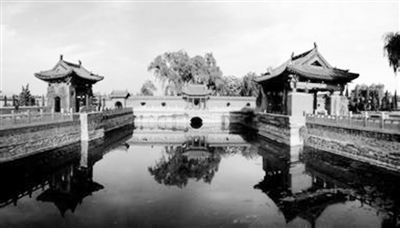
Jiyuan Jidumiao.
Final Thoughts on Your Trip
Visiting Jiyuan Jidumiao is more than just a trip to a historical site; it’s a journey into the depths of Chinese culture and spirituality. This ancient temple, steeped in history and legend, serves as a poignant reminder of the reverence that ancient Chinese society held for water deities, reflecting their deep connection to nature and the agricultural cycles that sustained them. As you explore the intricacies of its architecture, from the grand entrance to the serene courtyards, you are enveloped in a sense of peace and continuity that transcends time.
The temple’s enduring legacy, marked by centuries of rituals and royal patronage, illuminates the significance of water in shaping not only the landscape but the very essence of Chinese civilization. Each corner of the temple whispers stories of devotion and tradition, inviting visitors to reflect on their own connections to nature and the past.
As you depart from Jiyuan Jidumiao, take with you not only memories of its beauty but also a renewed appreciation for the cultural narratives that bind us all. This sacred space is a testament to the power of faith and history, inspiring travelers to seek meaning in their own journeys. Whether you are a history enthusiast, a spiritual seeker, or simply a curious traveler, Jiyuan Jidumiao promises an enriching experience that lingers long after your visit.
